When we initially purchased our property, I had NO idea that it would turn into the crazy homesteading adventure that it has…
Heck, back then I didn’t even know what the “homesteading movement” was– all I wanted was some pasture for my horses… And a compost pile.
Even so, God knew exactly what we would need, as our “horse property” has made the transition to a homestead quite smoothly.
I get a ton of emails and comments from readers who are just starting out on their journey towards self-sufficiency. Those types of emails make me sooo happy and I just want to stand up and cheer for you guys. So if you are in the market to make a move soon, I’m sharing 12 things you should seriously consider before purchasing any property for your future homesteading goals.
However–keep in mind that you don’t HAVE to purchase acres and acres to join the modern-day homesteading movement. If you are itching to become more self-sufficient in your current location, then my eBook will get you pointed in the right direction!
12 Questions to Ask Before You Buy a Homestead
1. Does it have potential?
Sometimes in order to purchase a homestead without breaking the bank, you have to look past what’s right in front of you to find the potential. Our property was a disaster when we purchased it– falling down fence, a washing machine in the back pasture, and waist-deep trash piles in the barn and shop. BUT- we knew it just needed some sweat-equity to bring it to life.
2. Is it BIG enough for all my future goals?
It doesn’t have to be thousands of acres, but even if you have the slightest inkling you might want a milk cow someday, make sure you have enough pasture space. Don’t underestimate how addictive this lifestyle can be *wink*.
3. Is the current layout conducive to my plans?
Is there room for a chicken coop or barn if you need to build one? Is there a sunny spot for a garden, or is the entire yard shaded by trees?
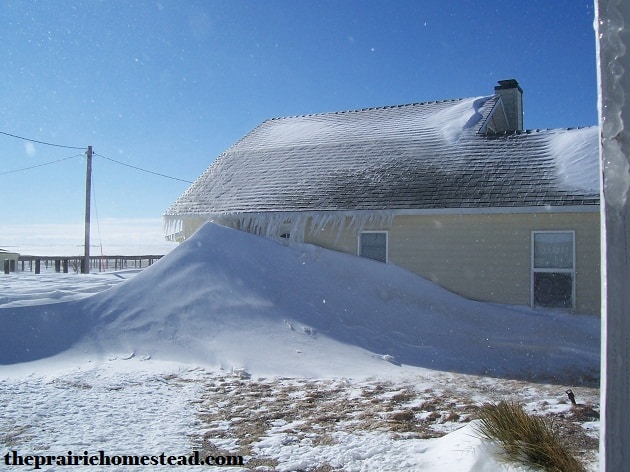
4. What are the winters like?
We had experienced plenty of brutal Wyoming winters before we purchased our property. However, we didn’t expect our front door to drift completely shut the first year…
5. What is the growing season like, and how long is it?
If you are shooting for maximum food production, a cold climate with a short season will make that tough. (Ask me how I know… Gardening is a struggle where we live (fruit trees hate me…) but it can be done (especially if you mulch!)– it just takes a bit more determination.)
6. What is the water situation? Is the well adequate?
Is the property on a septic system? How old is the leach-field? How many gallons per minute is the well? Are there any options for pumping/storing water off-grid? (Rain barrels, cisterns, hand pumps, etc- these aren’t deal-breakers by any means, but it would be a bonus to find a property with these features already in place.)
7. What are the neighbors like?
If you live in a very rural area, ‘neighboring’ can be vital to your success and survival. We are blessed to be surrounded by numerous ranchers who have helped us out more times that we can count– and we return the favor whenever we can.
8. Is it in my price-range? How much will any improvements cost?
As you know, hubby and I are huge fans of being debt-free. Even though we did take out a mortgage to purchase our place, our property payments aren’t extravagant, and we are shooting to pay off the mortgage very early. Even if you are looking at your dream property, I encourage you not to over-buy and put yourself in a bad place financially.
9. What are the outbuildings like? Can I start using them right away?
Outbuildings were a must-have on our list when we were looking at properties. With our harsh winters, we couldn’t afford to wait for years to save up the money to build from scratch. There is nothing wrong with older buildings/sheds/barns, just make sure they are safe and structurally sound. Personally, having ready-to-use buildings on a property was my primary concern when we were looking for property. We’ve had to do a TON of work to our outbuildings, but it was a lifesaver to at least have *something* there when we moved in.
10. How far is it to town?
Will you or your spouse still be working in town? If so, factor in time and gas money– it adds up fast! We are 40ish miles from my hubby’s place of work. He enjoys the drive, but it would make some people insane. 😉 If you are moving far from town, remember that movie nights and pizza runs will become fewer and far between- so expect a lifestyle change. For us? That’s a serious bonus– but I know not everyone feels that way…
11. Are there any zoning restrictions? Covenants? HOAs?
We were very particular about purchasing a property without any covenants or Homeowner’s Association rules. These seem to be the #1 headache for many homesteaders– and even though the rules might seem OK at first– make sure there is room for any of your future goals or plans. Some HOAs don’t allow clotheslines, chickens, or certain types or numbers of animals. This can be a serious roadblock on the road towards your homestead dreams. Make sure you know exactly what the HOA will allow before you buy.
12. What other possible hazards should I be aware of? Snakes, wildlife, tornadoes, blizzards, floods, drought, hurricanes, etc…
We deal with blizzards, rattlesnakes, drought-conditions, and tornado warnings on a regular basis on our homestead (and sometimes multiple things at the same time…). Honestly, we like a little bit of adrenaline now and then, so it doesn’t bother us too much. Find out what “adventures” your area might bring, and be prepared– both mentally and physically.
Listen to the Old Fashioned On Purpose podcast episode #29 on the topic Four Things To Consider Before Buying A Homestead HERE.
What tips can you add to the list for future-homestead-buyers?
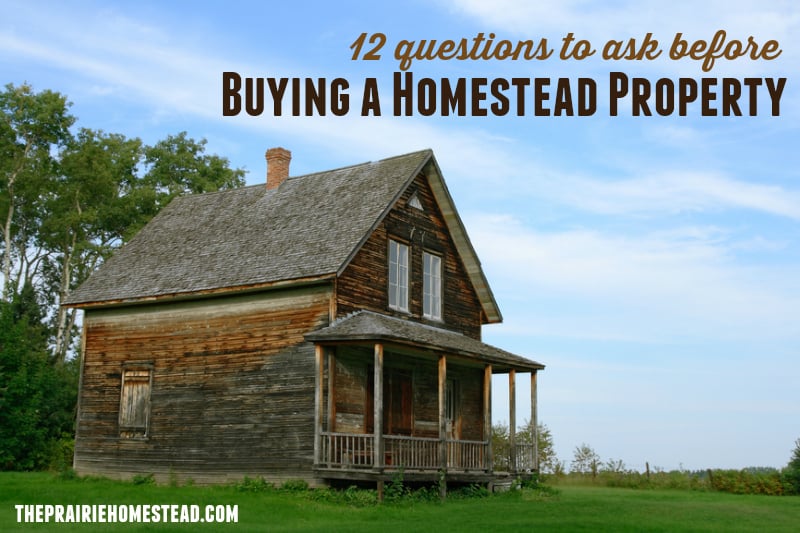

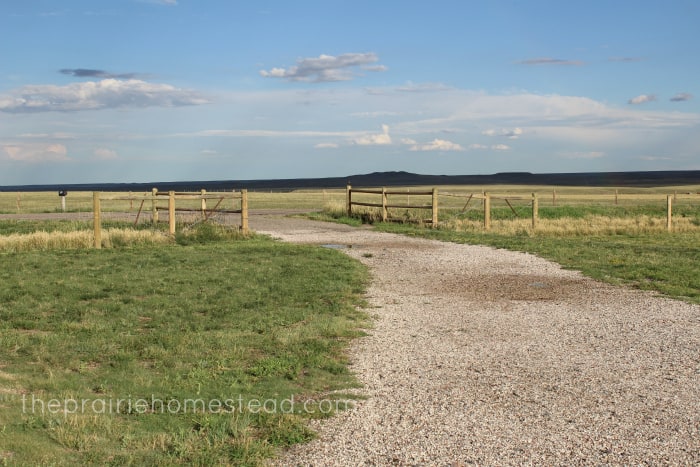
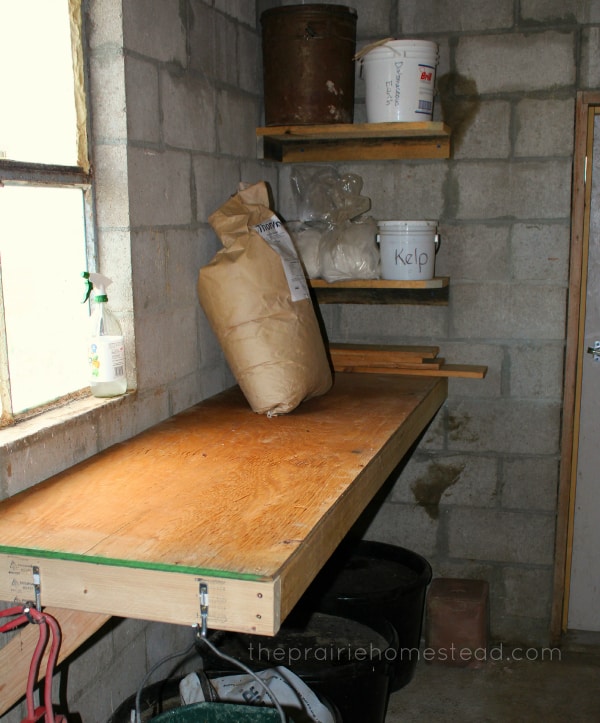
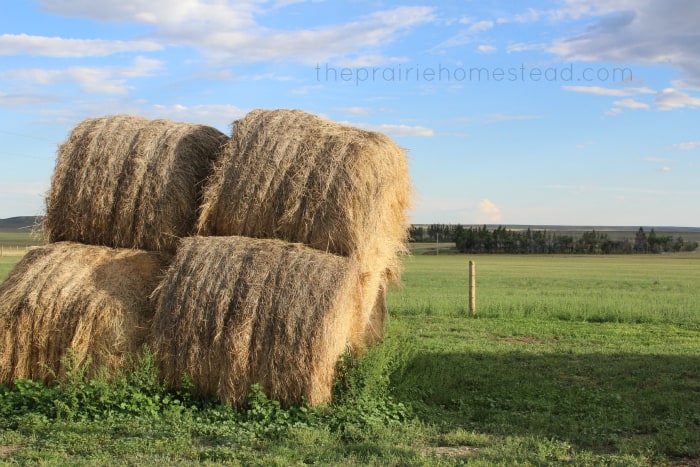

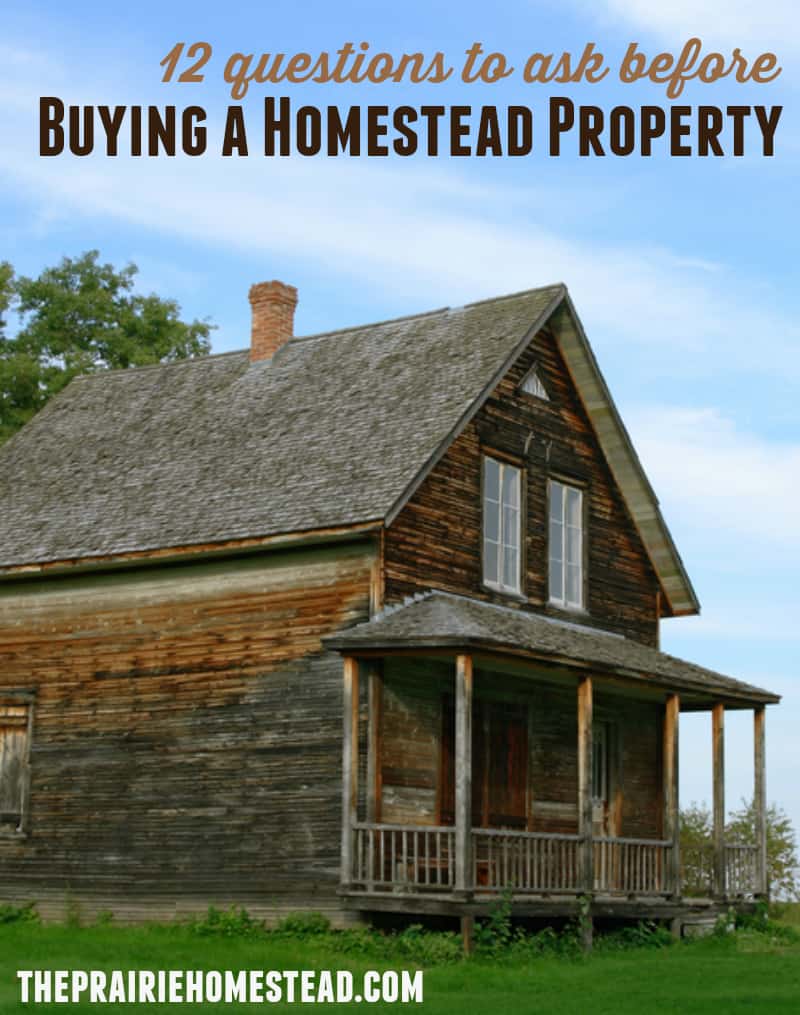


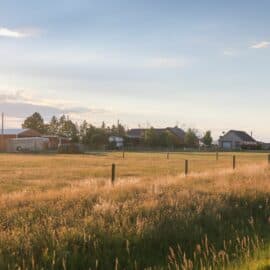
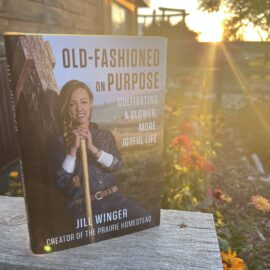
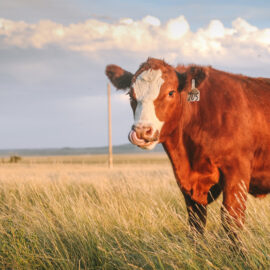
I like you can see the potential in property . . . which is especially helpful being a realtor. I have been looking for my “perfect” homestead property for a while and am not finding it . . . So then we decided to look for land to build on instead, so we could try to do passive solar and make the home energy efficient . . . well it’s hard enough to find affordable land in our area, let alone something that will support the proper orientation for passive solar . . . have ready many articles that say you should have a water source like a spring and some woods for an emergency fire source and wind protection . . . But seeing your property makes me think you can make a homestead out of any piece of land . . . Although I still dream of a property with a pond and some trees . . .
Yes! Of course, the “ultimate” set-up would be to have live water and trees– but that is definitely not possible for everyone. Here in SE Wyoming, you have to have a LOT of money to purchase such a property, as trees and water are both pretty scarce. So, I’m a big fan of making do with what you have. 🙂
SE Wyoming?! We just moved last year from Laramie. My husband is a WY native (Sheridan) and I lived there for 3 1/2 years before we moved to Arizona (talk about going from one extreme to another!). I hated living there at first but I grew to love it and your pictures are making me miss it!
Cool! Yeah, it’s a different sort of lifestyle out here- I was born/raised in lush Northern Idaho, so the landscape here is much different! But it has a rugged sort of beauty, I think. 🙂
I used to live in Moyie and loved it. Do you know of any properties in Northern Idaho where I could buy and homestead? Zillow doesn’t seem to have very much.
If someone sent you starter trees from here on the east coast would they start? I live in Northern Vermont.
It depends on the variety– we have to have TOUGH trees to survive here… Ones that can take hurricane force winds, no water, and lots of snow! 😉 I bought some fruit tress in Colorado a couple of years ago, and they didn’t make it–no matter how much I babied them. 🙁
One thing I would suggest is if you are moving in an area from quite a ways away that you rent a place for awhile. I know it is even harder to find place to rent but you want to be sure you like the area before putting out LOTS of money. I know of several families that have spent the money, gotten the mortgage, moved in and then HATED it. They didn’t care for the neighbors, the bugs, the lack of rain, the muddy roads, the county commissioners, the electric co-op, etc. Now they live somewhere they hate and can’t find a buyer. Their dreams of homesteading have been ruined (for one family, they NEVER want to live outside of a city again). We rented in a nearby town for a couple of years until we found our property. It was hard to wait but we then knew what the area was like and what we were getting ourselves into. Loved the pictures of your homestead!
I agree- excellent advice- we rented in our area for several years too. And we STILL were crazy enough to want to live here– even with all the blizzards, ha!
My grandparents and mom were raised in Wyoming. It was my Happy place. I hope to get back there some day still. I was on my way from NY and stopped in Oklahoma and fell in love with the lake. I Hope Wyo waits for me. I love reading your posts. Thank you for all your sharing.
Deb- which lake? There are so many pretty lakes here in OK. We are in the dry western part of the state, you must be out east.
Wyoming is my happy place too. 🙂 Thanks for your kind comment Deb!
That’s exactly what we are going to do. We will be relocating in the next few months, and although we ‘d like to be settled in our forever home, we need to assess the area first to make sure we are making the right decision. Thanks for your insight.
This is really a great idea. I had not given thought of renting first!
Good points all Jill…I would add under “water,” to make sure you have your water well checked for chemicals to make sure that it is healthy to drink or use. You need to educate yourself as to the previous use for the land and what could have leached into it whether from lawn chemicals, ranching use, orchard management or fracking. You also need to make sure that you know WHAT you are purchasing…just the surface rights or all mineral rights. Do you own the rights to whether or not your property can be drilled for oil/gas/coal or any other materials. What about uses for property near yours that could have leached chemicals or could continue to leach materials. I had neighbors that purchased property without ever checking that they butted up to land zoned for “industrial” use. They found out when a chemical plant began construction just over their fence.
Yes– I should have added that one in for sure– water can absolutely make or break a homestead!
Make sure you understand your water rights! Ours are so complex (but old and great) that it has taken 2 Water Masters (I want that title!) and the state Water Clerk to clear up the confusion. Also check with the county surveyer’s office to see if there are any surveys of your property. Most properties have never been surveyed in the U.S., so it can be expensive if there are any property line disputes. Also if pipelines or power lines can be run across your land under ’eminent domain’ laws. No fun to find a pipeline crew working under your bedroom window (happened to a good friend of mine). As you age, begin to look at how to handle the homestead if your children aren’t interested in the life. Hired help? Selling shares? Any other ideas? Homesteading is a wonderful life if you like challenges. Just make sure to talk to older homesteaders so you have a clearer idea of what lies ahead. Oh, and always, always save for when the pump blows out, the roof leaks, and the tractor won’t start no matter what the farmer does.
This is so spot on! We have been on our homestead for exactly one year and 2 days and these were the questions we had to continually ask ourselves….especially when one of us fell in love with one aspect (like me with the house or Sheldon with the land) while the other was clawing at the door to run back to the truck. It takes compromise on some things (clearing land, rebuilding structures) but you have to be absolutely steadfast on others (does it get enough sun at the right times for growing grass, will you have the money immediately to make improvements to support your current needs?)…thanks for sharing!
One thing to consider in the western US is if your property has water rights for irrigation water. Where I live in southern Idaho irrigation water rights are gold and many people have sold theirs off and many people buy property and find out they don’t have water rights, and irrigating your garden or pasture using well water is expensive and really takes a toll on your budget as well as your well pump. Many properties that are for sale for super cheap with acreages of 10+ acres are only that cheap because they have no irrigation water, so really no way to water all the land, and in southern Idaho, if you don’t have water, you’ll be buying a lot of hay to feed any animals you have. Another suggestion on buying properties is definitely come to an area and check it out before you buy. I have lived in southern Idaho and northern Idaho and have seen many “city folk” buy places online that they have never really seen in person, or just visited once, and once they get here are overwhelmed by everything and for many of them it is a huge culture shock if they aren’t used to the predominant religions out here, the fact most places are closed in the evenings and weekends, etc. And also for those looking for good deals on places, don’t be afraid to look at foreclosed properties, people hear so many horror stories about foreclosures, but many are great properties, although it does pay to get it inspected to make sure everything is in good working order and that the place has water rights. We got 4 acres, a house, 2 sheds, a quonset building, well house, and a fully fenced in 2 acre pasture that was done up in goat fencing, for $44k with water shares and a fully working well and septic system. While we eventually want to upgrade, starting small is sometimes good when you are trying to figure out what you are doing. And lastly don’t start too big. A couple of my neighbors have moved to the country and immediately bought all sorts of livestock, numerous fruit trees, plant huge gardens, and have just gone crazy doing everything at once, and spent a lot of money on things they didn’t really understand how to work with, and then ended up getting burned in the end, when they couldn’t keep up, trees died, etc. I think its better to take things slowly. Start with a garden, maybe an animal or two, and then gradually work your way up, unless you have a bunch of excess money lying around. Same with going with alternative energy like solar or wind energy, if you plan to install it yourself, you can gradually buy pieces to the setup, so you aren’t spending a lot of money at once.
EXCELLENT points Cat– lots of wisdom here! 🙂
Cat,
What state are you in and what part? Also did y’all buy foreclosured land?
Thanks Tori!
I agree,foreclosures in the country can lead to great buys. But be aware. Banks hire the worst of the worst realtors for these jobs, rarely give any concessions (fixing a leaky roof), and draw out the process beyond anyone’s sanity. We paid for all inspections and repairs. It took 9 months to close and a lawyer very knowledgeable in foreclosures and property deed issues to get us a free and clear deed. And we were paying cash! All that being said, the property we bought fits all our dreams — house, land, outbuldings, fencing, etc. Our kids haven’t looked back with any regrets and my husband and I feel like we landed in paradise every day.
We decided a few years ago we needed to move from the downtown area of Tampa for safety reasons from the 50×100 ft lot that we owned with a wonderful old home and square foot garden boxes (city allowed us to have 2 chickens also). We started looking for at least 2 acres so we could have a bigger garden and more chickens. We had our hearts broken many times thinking we had found the perfect property and lost it due to bidding or other issues. On a Thursday night my husband was looking at the HUD website and found a new listing in Zephyrhills FL. Five acres, a newer double wide, fenced and cross fenced. We drove out that night to look. On Friday morning we submitted the bid at 10% over asking which took it to $50,000! Three very long and aggravating mths later we finally owned the place! True we have 3 miles of dirt roads to get to the place (my little red sports car is useless so I paid cash for an old beater truck), true, rainy season really is a mess here BUT 19 chickens, two gardens and a nice barn/shed later it is starting to feel like home. I miss my historic old home some days and my friends still tease me about the double wide trailer but we have room to build and the money now to do it when we get around to it. The best thing of all? I feel safe and we can sleep with doors unlocked!
Wow Lisa– what a deal! Sounds like you have a wonderful set-up! 🙂
One of the greatest things about moving from the city to the country is the seclusion, one of the worst things about moving from the city to the country is the seclusion. Be sure you can handle being alone some days, it is quite an adjustment especially if you are used to being surrounded with people and conveniences.
Nice to finally hear about someone homesteading in Florida! My husband’s parents gave us 5 acres in North Florida and we will be building in the next few months. It is heavily wooded and the soil is pure sand, but there is so much potential and I am hoping to have a thriving garden and fruit/nut trees in the next few years.
Hi Kay! Ours had been cow grazing land for the past 50 years and the 5 acres were we are at was where the feed stations were so the ground is pretty good and not too sandy. We only have about 3/4 acres of woods but we may use that are for a small hog or two in the future. Get some chickens, build a “poop board” under their roosts and you will have all kinds of compost to use in a garden pretty darn fast! We lost my big fancy garden this year to all the rain we have had so moving it to a bit higher ground for next years spring planting but I guess too much rain is much better than too little 🙂
Hi!! We are about to start looking into buying some land on central northern Florida and wantes to ask how is your experience homesteading here? We live in south florida for the 15 years but want the country life now that we are parents of two girls. I now is a long shot sinsince u wrote this over 3 years ago but worth to try ?
Flooding can be a major concern and can raise insurance rates. Where my parents live the sound flooded all sound and canal front homes in hurricane Irene 3 feet deep. The place we are looking at had about 2 feet of water on it. One flood like that can wipe out all your crops.
We just bought a farm outside of Sheridan, WY. I’ve lived in WY for over 30 years and planning to spend the next 30+ here. Love your blog, Can’t wait to start ‘our’ homestead life. ,
Lucky you! Sheridan is gorgeous!!
Jill, I would add EASEMENTS to your list. We have a mountain forest property that has an easement road through it for two other property owners. We share the use of a locked gate. Though we have not had any issues with finding the gate left unlocked or having passers-through poking around in other areas of our property, we do wish we could just have our property to ourselves! There is some peace lacking with this arrangement.
Very good point Linda!
Make sure the property has been surveyed, and it is on file with the proper county/state offices. If it has never been surveyed, request it be done before you buy.
Hey Jill,
I found out about your blog a couple of months ago from my sister and I wanted to tell you that I love it! My husband and I (And our 18 month old son AND our bun in the oven) have been on the “homesteading” path for a couple of years now. Or at least making our way on it, one step at a time!
I wanted to tell you that I absolutely LOVE your French bread recipe and is my new favorite bread recipe out of all the ones I’ve tried in the past. It’s so dang easy to make and practically fail-safe! And you were right: it gets eaten up fast! I made extra loaves one night and gave one to my mom, dad and siblings still living at home and the entire loaf was gone within 20 minutes of pulling it out of the oven. So it’s definitely a hit! Thanks for posting the recipe and I always look forward to more recipes in the future!
Hey Katie- thanks for taking the time to leave a comment! I’m so happy you are enjoying the blog, and the French bread! 🙂
I would add a soil test, learning whether the neighbors have dogs and whether they let them run free (if you’re getting chickens), and testing the house for radon (which the current owners should have fixed before you buy, if necessary).
Great advice! We are only on 2/3 of an acre, but thankfully no HOA or major restrictions. I am limited to up to 49 chickens. 😉
Wow– 49 is pretty darn good!
The joys of living in the Appalachian mountains! 🙂
Our 7 acres was completely unimproved. There was a limited amount of embedded energy around us – there were water lines but we had to wait for an opening for a meter from the water cooperative. There were power lines (for single phase power only – some things on bigger scale might need three phase electricity) but we had to pay several thousand extra dollars to get the power lines to our property and convince our neighbor to add a pole to his place. There was a phone line but dial-up and satellite internet were and still are our only options. We had to by a booster to be able to use our cell phones. A lot of these are so readily available and many resources like municipal funding go into providing these services that we don’t realize in the country how much we provide and the time and energy it takes to secure them.
I would love to add to this, having only a few years ago purchased a small-scale spot, and so had to meet my criteria to do that. Mind you, I am writing from Australia, so some of the things may not translate:
I would add:
1. Get the soil tested. If you are planning on growing food, then you need to know what’s in there – if it’s previous agricultural land then all manner of nasties could be there. Can also be handy testing for other contaminants eg metals, and levels of available nutrients and pH, so that you know what you’re dealing with at the start (where we bought was a major agricultural area – we’re technically part of the town but next to us is a potato farm, and our area is well known to be riddled with Dieldrin (related to DDT) so for me soil testing before buying was a must).
2. Do a permaculture design course. Then you will have a better idea of what you are looking for, and how you can adapt to the not-so-ideal aspects in a sustainable and (hopefully) non back-breaking way. The old adage, “you don’t have a snail problem, you have a duck deficiency”.
3. Before you buy, do your research – on the area you are looking at, as well as how to do what you want to do – no sense waiting til you get your space to start learning how to grow your veggies – know how to do these things beforehand, there are plenty of courses out there. And research where you can buy what you need – the internet and postal service means you can just order with a few clicks of a button, and once you have your space, you will know who can sell you the cheapest whatever-it-is that you want/need.
4. What public transport is nearby? you may not always have a functioning car to get around in, and you may not appreciate being completely isolated in that situation.
Hope these suggestions might help someone?
EXCELLENT thoughts Abbie!
Great tips here! We are currently “farming” in the city with chickens, veggies, fruit trees and bees while paying off some debt and dreaming about our “forever home” on a nice piece of property somewhere. Lists like this (and the wealth of information in the comments) are perfect and greatly appreciated as we continue our journey towards full on homesteading 🙂
When we were looking for our acreage, since we already lived in a rural community we were more concerned about features like how far to a paved road, who was responsible for road maintenance, what school district it was in and how far from the school. If your not planning on having a large family, your kids might not have a “neighborhood” to play with as the nearest neighbor could be quite far away. We’ve known people that loved living in the country but decided to move into town because of all the driving for kids and schools. It is much more expensive to drive several miles to town for school functions, sports practices, play dates with friends, etc… We found a small place only 1 mile from a tiny town of 250 people on a paved road that had everything we wanted and was both close enough and far enough, if you catch my drift.
We bought our property several years ago after an extensive search. Our criteria: Within 1 hr commute to our big-city jobs which we held for a few years after we moved. Isolated with plenty of elbow room and only 2 neighbors on the whole road but grocery shopping, hospital, doctors, movies, etc is as close as the next town only 20 minutes away. Although we don’t even care about potential minerals, we wanted enough mineral right ownership to where no one could come onto our land to drill without our permission. When we laid eyes on our property we knew it was “the one”. It was in very rough shape and completely overgrown but we could see the potential and our future here. We put in lots of elbow grease to get it operational but our hearts are here! Because of it’s location it has greatly appreciated in value already and will continue to do so until we are old, fully retire & require a smaller place.
~Taylor-Made Ranch~
Wolfe City, Texas
My husband and I just bought what we consider our dream home. 🙂 We live in SW Ga, my husband is stationed in Ft. Benning and we just bought our house on 18 acres back in January. My dream is to become self sustaining and I believe its very possible with the potential of this place, but it will take lots of money and hard work. I’m not afraid of the work at all, its the money that makes it seem near impossible. :-/ But I’m determined to make it a reality. Our house is situated at the bottom on a small valley and we have about a 4acre open field at the top of the hill. (I planted some apple trees within the first month of moving here and so far so good) We also have a 3 acre pond within about 25 yards from our back deck that is spring fed with a good amount of bass and brim. Obviously to get any livestock we will be building from scratch as there is no barn or fence anywhere, but I’m not letting that hinder me. Over the labor day weekend my sweet husband built me a small coop and a run. 🙂 we just got a rooster and 3 RIR hens. 🙂 I’m excited beyond belief, I feel like its our first step to achieving our goal! Next will be us building some raised beds close to the pond for vegetables and I really want to test our pond to make sure its safe to water my plants and eventually possibly pump up the hill towards the field to water the orchard and animals. I’m really really new to all of this and any advise would be greatly appreciated. Obviously most of the care of this place lays in my hands BC of my husbands job but that doesn’t scare me. 🙂 I’m only 24 so I figure now is the time to start getting experience.
Way to go Laken! Your new place sounds fantastic– and just keep saving and plugging away. We had no money when we started our adventure either– but we just took one project at a time, scrimped and saved, and put in lots of sweat equity to get where we are now. It totally paid off. 🙂
Thank you. Its so hard, when I have such big plans for this place and know it will be years before we actually get there. But we celebrate the small victories. I found our first 2 eggs from our hens today and I was so excited to call my husband I dropped one lol. Hopefully we will get there in the end though. 🙂
Whoohoo! That calls for a celebration! 🙂
We just moved to our new 20 acre spread here in SW Oklahoma. These 12 Questions are spot on for what we were looking at. We have a house and a barn and alot of neglected, overgrown land. So much potential. Cyottes have been put on notice, Winchester .22 is good at that.
So our adventure begins. Thanks for the info and inspiration.
You bet Al– And yes, a .22 is a homestead must-have in my opinion. 🙂 Congrats on your new property- sounds spectacular!
Thank you so much for this very informative article. The hubby and I will be out looking at properties at the end of the month when we go visit his mother in California. I am so excited to be beginning this adventure. Much love to you and your family. Peace.
Brandy
Great post! I would emphasize to check and double check the zoning and the animals you even possibly PLAN to raise at any time in the near (or far) future. Easier to buy where they are allowed then fight City Hall once you buy and move in. Also, the comment about the .22 is spot on. Do some research into predators. Had I known Copperheads live in the woods here I might not have been so quick to agree to live backed up to woods and all these piles of dried leaves and fallen trees!
And water…good comments about water. For me, having a water source at the barn is a MUST. We’ve carried pails of warm water to the barn for our horses in the dead of winter and its hard work, dangerous if you slip on the ice and necessary when you raise animals and don’t have water AT the barn!
Loved the post as always Jill!
Lisa
Fresh Eggs Daily
Copperheads– eeek! For some reason, the thought of those bug me worse than rattlers, I don’t know why. 🙂
In the Midwest it would be wise to have the well water tested to be sure it is chemical free. With years of runoff from farm chemicals this is a serious issue especially if you have infants. In Iowa septic systems must by law pass inspection before a property can be transferred so that is one less issue to worry about. I’d also inquire at the local Sheriff’s office about the property. Meth manufacturing is a huge issue and you really don’t want to buy a property contaminated with meth chemicals. A favorite spot for meth manufacturing is abandoned or empty farm buildings although each year at harvest farmers find abandoned meth labs in fields. As far as neighbors, bad neighbors can make your life a total misery so maybe stopping at the nearest neighbors to introduce yourself and talk about the property you are buying might be a good idea. Asking about the property at the local farmers cooperative might also be informative.
Yes- excellent bit of advice!
Great post! We are considering this lifestyle. Since you are far from town how do give your children ways to socialize with other children? Do you homeschool? Is it lonely for you as the mom?
Not gonna lie- it’s a challenge sometimes! You definitely have to work harder than the average person to make sure that you and your kids are seeing enough other human beings. 😉 I had a lot of friends here, but some have recently moved away- so that’s been tough. I plan on homeschooling, but my kiddos aren’t quite old enough yet. This year, I’m sending my 3 year old to a preschool in our tiny town– just a couple hours per week. I probably wouldn’t have done that, but our church doesn’t have any other kids her age, and her other friends moved away, so it’s really helped her. 🙂 So yes, it’s tough sometimes, but for us, it’s still worth it.
Checking the predator level well before adding any stock to avoid finding a horror scene of your stock being ripped apart, also the natural resources available to you around your potential property i.e. hunting, fishing, gathering, firewood. also for us personally it was important to have land that is bordered by national forest…i can walk out for hundreds of acres off of my land but no one an walk onto mine..we were able to obtain grazing allotments from the NF so we can graze off of our land.
Great list! Thanks! We’ve recently moved from the city to a more rural area 3 hours away, on the coast of NC. We now have a whopping 1 1/4 acres, but our wonderful neighbors have given us use of some of their land for a big garden (I grew up in a farming family – the garden is a lot bigger than I’d do if I were a newbie!). My son and I are both keeping our eyes out for inland acreage nearby for hunting and perhaps animals — my hubby isn’t totally on board with that yet, but if we found a good deal, I think he would be. I think our “perfect” scenario would be to live here and have land within a half hour for some animals, hunting, and camping. (We’ll have chickens here next year.) I don’t mind driving to the homestead, and that would probably fit our very water-oriented life the best. Getting acreage on the water? Not unless I win the lottery!
Well written post!
I’d add that you should look at existing infrastructure. It expensive to add.
We bought land with a barn gate and dirt road but had to add an all weather road with culvert and trim trees and rearrange some fence to get power to the barn.
We also had ponds and water catch but added a well to have enough water all year.
Next we will add septic system and rock some more of the road.
The property is fenced but it is at the end of its lifetime, so lots of fencing work to do.
Try to buy land where people have lived as most of this will already be existing.
So many great tips and comments! Thank you Jill and everyone!
Make sure you own your mineral rights too! Here in Southwest Idaho mineral rights are becoming an issue. The State of Idaho has sided with the Gas and Oil Industry and is giving them the right of way against property owners. If you don’t own your mineral rights, and in some cases, even if you do, gas and oil companies can probably do what they want on your property. (Not really good if you’re trying to grow organic food!) It’s a hot topic to those who are affected by it. Be cautious where you buy your property and what kind of industry could come in. I have to say, if I had known what was planned for my region, I would never have purchased here. Hopefully it will remain livable.
Yes! Water and Irrigation are extremely important! Probably one of the most important things to consider.
Good Luck Everyone!!
I appreciate that you point out that it is important to think about how far away the town is. I can see why some people might need to live closer to the city. I have been thinking of buying some land away from the city that my family and I can go to during the summer. I’ll have to make sure to choose somewhere that isn’t too far away in case we need something.
My wife has wanted us to get ranch properties for a while, because she grew up on a farm and loves the open space. I really like how you talked about making sure it is in your price range though. I would love to be able to find something she likes in our budget, so I might have to look for a realtor who specializes in ranch properties to help us search!
It’s good to know that when it comes to buying land to farm on that there are some questions that we need to remember to ask to know we choose the right one. I am glad that you elaborated that we need to ask about the water situation so that we will know if it is adequate and if there are different options like a rain barrel or hand pump that we need to work with. This will help narrow down our options so that we will be able to find one that will work well for us.
It is good to know that it would be smart to ask if the property has a septic system. If I was going to buy a homestead I would want to know what the plumbing situation was like on the property. That way, if something went wrong I knew who to call.
We getting nice information through this blog.
It’s Great and Very Helpful.
Thanks again and keep up the great work!
How do I find out about some of these things when considering a property, such as water and mineral rights, easements, who owns, can use, and is responsible for maintaining access roads, and the like? I’m feeling overwhelmed not knowing how to begin or proceed? Thanks everyone!
These are some pretty important factors to take into consideration; after all, buying a homestead or ranch is nothing like buying a suburban home. I particularly like that one of the points you make in the article is about the growing season. If you’re planning to grow crops on your land then you need to figure that out in order to plan out which crops you want to grow and when.
Thanks for informative post! We are considering this lifestyle. Since you are far from town how do give your children ways to socialize with other children? Do you homeschool? Is it lonely for you as the mom?
That way, if something went wrong I knew who to call.
Hey, I must say It is really a great and helpful blog for the who are planning to buy a homestead. I am also doing homesteading and I bought this just a few years back, and I am not regretting after buying this. I just enjoy the beauty of nature over my place, but it is quite difficult to choose the best homestead that fulfills yours all requirements for those who are planning to buy a homestead I will suggest them to check the properties on Ozarkland website, they deal in various properties and undeveloped lands. The homestead that I owe is bought from them and I am just in love with it, you will not have to worry about down payments they will give you properties with owner financing.
Wonderful, what a web site it is! This webpage provides useful information to us,
keep it up.